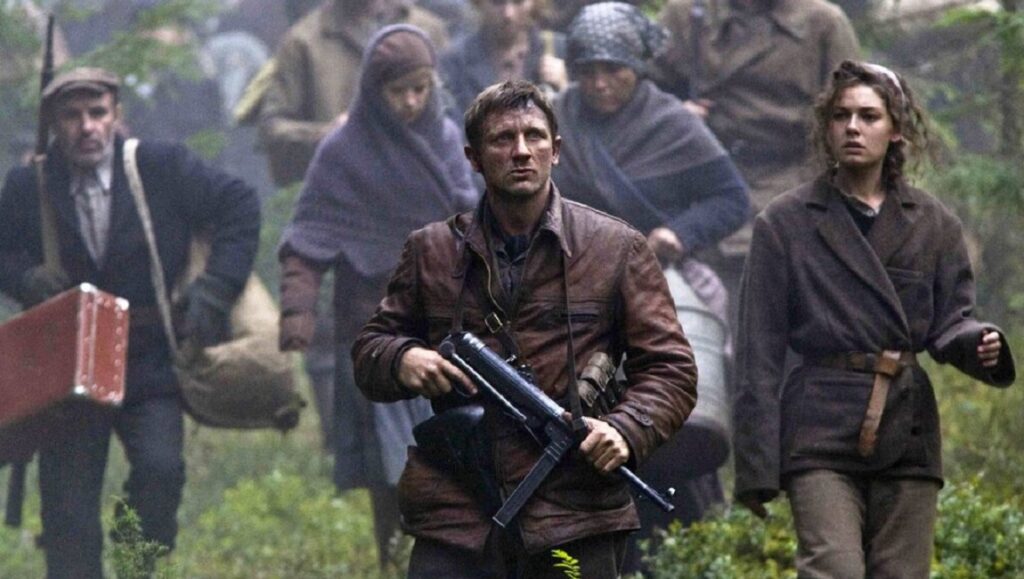When you try to conjure up an image of the holocaust, what comes to mind? Maybe Schindler’s List, The Pianist, The Diary of Anne Frank, and so on — there’s a good number of highly acclaimed dramatizations of the period, but they usually all tell a similar but incomplete story. As it turns out, not all of the Jewish people either fled to other countries or ended up in concentration camps. Defiance tells the story of the Bielski brothers, who gathered refugees and led a resistance group against the Germans. Surely, their tale is one of heroism, sacrifice, and desperation; one worthy of a big-screen adaptation. But this particular big-screen adaptation does not do their story justice; if you’re looking for a Hollywood WWII action flick, with explosions and the like, you’ve got it. If you’re looking for the somber yet uplifting tale of an oppressed people deciding to fight back in desperation, you could do better. Too often in Defiance it feels like the holocaust premise was just an afterthought.
Defiance should have been about the elder Bielski brothers, Tuvia (Daniel Craig) and Zus (Liev Schreiber), struggling with their own morality in a bid to save their people, but instead, Zwick’s film just ends up being a couple guys being badasses in the woods. Sure, Craig’s version of badassery is a little more touchy-feely than Schreiber’s, but both performances lack nuance. Viewers are forced to wonder if men struggling to survive through winter while fighting against the Nazis would have the composure to give so many rousing speeches, especially when each resonates so strongly with sentiments of freedom and unity more common in modern-era America — not every line needs to sound like something out of G.I. Joe. At the very least, maybe a different method of communication could be used every once in awhile. That, plus the image of James Bond himself riding around on a white horse that appears to come from nowhere (reaching a little too overtly for the sake of striking heroic imagery), sufficiently serves to derail the film.
And while Defiance certainly isn’t hard to follow, it does get pretty tiresome. Zwick clearly doesn’t trust his audience to feel emotion at all without heaping on cheesy dialogue, which might be considered a lesser offense were the plot not so ambitious and self-important. Instead, it’s all very stereotypical, and lacking in any real emotional resonance. Sometimes, scenes can even seem downright comical, as is the case when the brothers Bielski gather together a group of new arrivals to the camp, in hopes to learn what valuable talents they may possess. One of the refugees stands up timidly and announces, “I’m an accountant.” Whoa, hold the phone, a Jewish accountant? Apparently the only useful Jews are James Bond and Sabretooth. Elsewhere, characters who may have otherwise broadened our view of the conflict are obtuse: the city-dwelling intellectual is nothing more than his stereotype — har har, he’s never used a hammer before, what a classic. The surly, jaded rabbi (I bet you’ve never heard that one) gets into a few arguments with the intellectual, but each lacks candor; it feels like this screenplay just invents arguments because these stereotypes demand that they argue with each other (and play chess). Later, the rabbi reveals that his faith’s been wavering, and that, thanks to Craig’s character being so goddamn inspiring, he believes once again. He then coughs, sputters, and dies; there’s a pause long enough for the writers to congratulate each other before Nazis storm over the hill. The scripting here is simply way too Hollywood, and the thing drags on for simply way too long (roughly 150 minutes).
Oh, by the way, did we mention there were four Bielski brothers? With Craig and Schreiber dominating the screen time, it’s easy to forget their younger brothers were there at all — at least until one of them conveniently finds his balls and goes commando near the end so that we’re forced to remember him, but honestly his name is already forgotten by then. And the side characters just seem quirky and unnecessary to the overall narrative, a sentiment that applies twofold in regards to the gratuitous romances tossed into the film. Speaking of tossed in, let’s not forget about the girl whose baby is the product of rape by a German soldier — this otherwise powerful story is picked up and dropped with all the grace of a mudslide, and has the overall effect of moving along a romance that couldn’t be cared less about to begin with. It’s emblematic of Defiance‘s prevailing, insurmountable essential problem: too many of the film’s supposed moral issues feel either hollow, pretentious, and unfortunately inconsequential.
Last Word: While Defiance isn’t a complete failure, it’s riddled with its fair share of clichés and absurd pitfalls, particularly when considering what could have been done with the potentially rich source material.


Comments are closed.